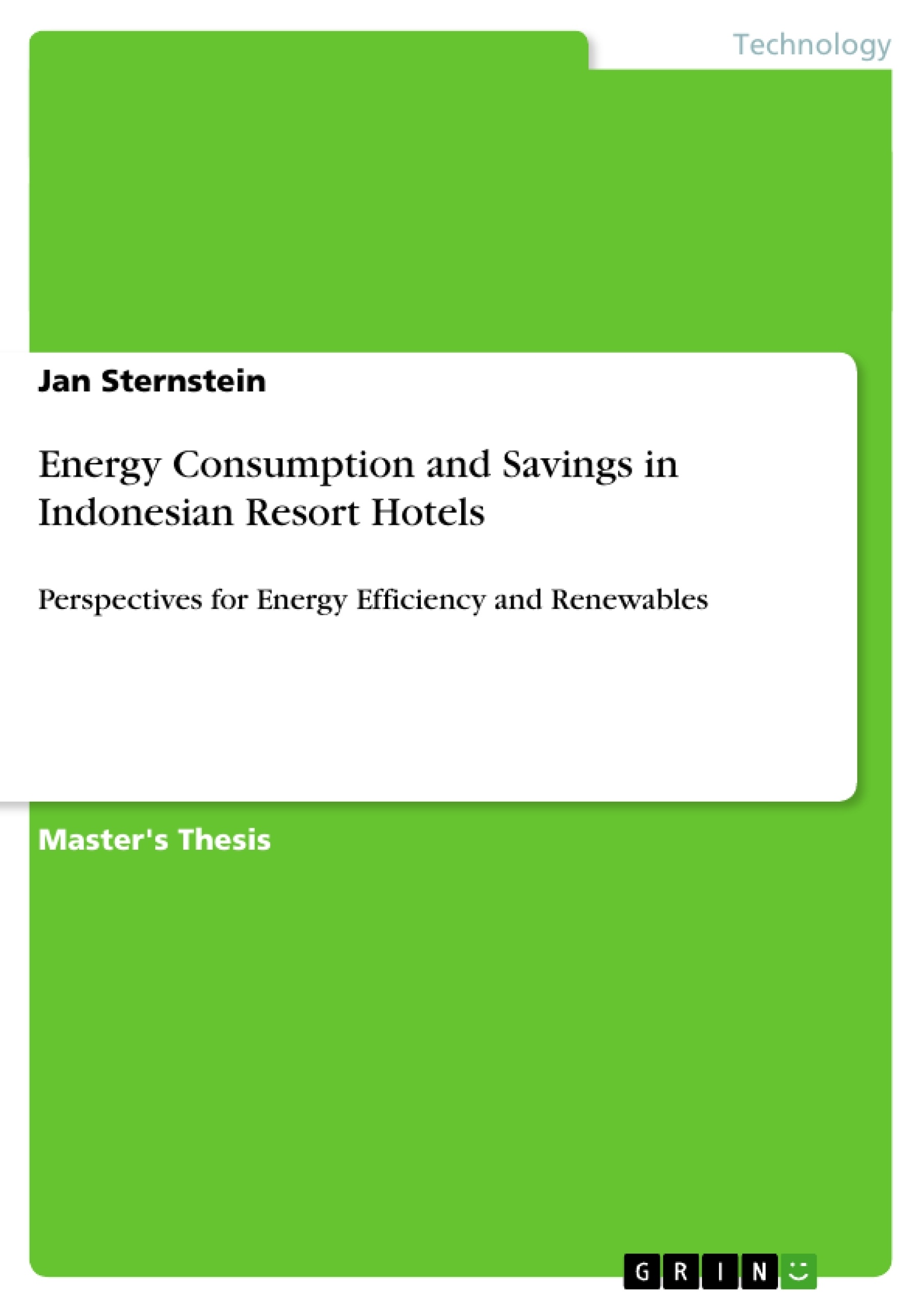Energy consultations were conducted in Indonesian resort hotels to get a deep insight into current energy practices and to develop improvement measures on a technical level. Soaring energy prices and a trend towards sustainable tourism in Indonesia make energy consumption an urgent question of business profitability in hotels. The research presents common consumption practices of small to large resorts and points out wasteful processes. As a guide for decision makers and engineers in the hotels a catalogue with improvement measures was developed, fitted to the Indonesian climate and energy market conditions. Energy efficient and renewable warm water supply solutions are assessed with dynamic economic methods and backed with sensitivity analyses, pointing out highly attractive investments and indicating a market for technology suppliers. Further innovative concepts for the exploitation of waste energy or renewable sources in resort hotels are discussed. The research reveals need for action and concludes with a set of key recommendations for decision makers in hotels.
Inhaltsverzeichnis (Table of Contents)
- Foundations
- Overview
- Indonesia and Tourism
- Weather and Climate Conditions
- The Energy Sector of Indonesia
- Supply Side
- Demand Side
- Energy Policy
- Energy Prices
- Trends for Energy Efficiency in Buildings
- Research Method
- Reasons for the selected Method
- Energy Consulting
- The German Guideline VDI 3922
- Energy Consulting Approach by the dena
- Implementation
- Data Processing
- Energy Conversion Factors
- Correction of the Energy Consumption
- Energy Characteristic Values
- Comparison with Benchmarks
- Economic Concepts
- Methodical Procedure
- Static Payback Period
- Dynamic Economic Concepts
- Findings of the Energy Consultations
- About the collected Data
- Introduction of the Hotels
- Current Energy Situation of the inspected Hotels
- General
- Current Practice and Energy Infrastructure
- Energy Consumption and Energy Carrier Mix
- Constant and variable Energy Consumption
- Air Conditioning
- Energy Flow Analysis
- Energy Costs
- CO2 Emissions
- Best Practice Examples
- Benchmark Comparison
- Energy Saving Measures
- Order of Measures
- Avoiding unnecessary Energy Consumption
- Optimizing the Energy Infrastructure
- Energy Recovery
- Investment in efficient and renewable Technology Solutions
- Catalogue of Measures
- Perspectives for efficient and renewable Technology Solutions
- Overview and Technology Requirements
- High System Efficiency with Heat Pumps
- Heat Pumps and Operation Conditions in Indonesia
- Exemplary Calculation of Profitability
- Combination of Heat Pump and Chiller System
- Suitable Renewable Energy Solutions
- Overview on Renewable Energy Policy in Indonesia
- Irradiation
- Solar Thermal Water Heating
- Further Application Fields for Solar Energy
- Photovoltaics
- Energetic Use of Organic Waste
- Chances and Barriers of Renewable Energy Use
- Conclusion and Recommendations for Action
Zielsetzung und Themenschwerpunkte (Objectives and Key Themes)
This research analyzes the energy consumption and saving potential in Indonesian resort hotels. It aims to understand current energy practices, identify wasteful processes, and develop improvement measures on a technical level. The study focuses on the development of a catalog of energy efficiency and renewable energy solutions suitable for the Indonesian climate and energy market. The work highlights the need for action and presents recommendations for decision makers in hotels. Here are some key themes explored in the research:- Energy consumption and saving potential in Indonesian resort hotels
- Energy efficiency and renewable energy solutions
- Investment in efficient and renewable technology solutions
- Economic analysis of energy efficiency and renewable energy solutions
- Recommendations for action for decision makers in hotels
Zusammenfassung der Kapitel (Chapter Summaries)
Foundations
This chapter provides an overview of the tourism sector in Indonesia and the country's energy landscape. It discusses the weather and climate conditions, the energy sector, supply and demand dynamics, energy policies, and energy prices.Research Method
This chapter details the research methodology employed, focusing on the energy consulting process. It outlines the German Guideline VDI 3922 and the energy consulting approach by the dena. The chapter also discusses data processing, including energy conversion factors, correction of energy consumption, and the calculation of energy characteristic values.Findings of the Energy Consultations
This chapter presents the findings of the energy consultations conducted in various Indonesian resort hotels. It details the current energy situation, including energy consumption and carrier mix, as well as analyses of constant and variable energy consumption. This chapter also provides insights into air conditioning systems, energy flow analysis, energy costs, CO2 emissions, and best practice examples.Perspectives for efficient and renewable Technology Solutions
This chapter explores the potential of efficient and renewable technology solutions in Indonesian resort hotels. It examines the applicability of heat pumps and analyzes their profitability. The chapter then focuses on suitable renewable energy solutions, including solar thermal water heating, photovoltaics, and the potential for using organic waste for energy production.Conclusion and Recommendations for Action
This section provides a concluding summary of the findings and presents recommendations for action for decision makers in hotels. The focus is on promoting energy efficiency and the adoption of renewable energy solutions.Schlüsselwörter (Keywords)
The study focuses on energy consumption and savings in Indonesian resort hotels. Key areas of interest include energy efficiency, renewable energy solutions, heat pumps, solar thermal water heating, photovoltaics, organic waste energy production, and the economic viability of various energy-related investments. The research also emphasizes the importance of sustainable tourism and the development of a catalog of energy-saving measures tailored to the specific needs and challenges of the Indonesian hotel sector.- Citation du texte
- Jan Sternstein (Auteur), 2011, Energy Consumption and Savings in Indonesian Resort Hotels, Munich, GRIN Verlag, https://www.grin.com/document/180419



